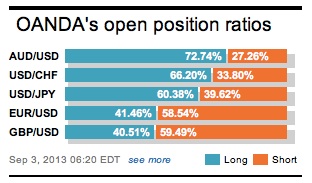It keeps coming and coming, the wave of better-than-expected PMI’s globally has pushed most equity markets up in Asia and into the black. Yesterday’s PMI data from Markit showed that even the weakest euro-zone countries have turned ‘that’ long-awaited corner and now are part of the “expansion” crowd rather the “contraction” group. Germany and the U.K. are alone, that’s to be expected, but the numbers from Spain and Italy tell a different story – they are “escaping the tentacles of recession.” Investors should expect rumors of impending missile in the Mideast to continue to keep capital markets on edge. Risk on and risk off is the trade that is expected to dominate. Markets should anticipate the ‘mighty’ dollar to wobble, but not fall under uncertainty.

Despite the holiday-shortened week, this is a big week for investors, and not just for the unanswered Syrian question. The Fed gets to focus on the US labor market for deciding when and how fast to cut back on asset purchases. This Friday’s non-farm employment situation report will be key as it is the last payroll report before the highly anticipated mid-month FOMC meeting. “Helicopter” Bernanke and company has assured investors that the timing of tapering is data dependent and NFP is the granddaddy of fundamental data. The market should be expecting that the employment report from here to the remainder of the year in particular will be more of a contentious release.

So far the JPY and the USD have caught intermittent safe haven bids courtesy of the Russians this morning with ‘Mother’ Russia indicating that ballistic “objects” have been fired in the Mediterranean. This is the name of the new game with “who, what and where” keeping trigger-happy traders on edge. This morning’s “cry wolf” from Russia will not be the last. If and when something does happen all of us will be made well aware.
Down-under it was Governor Stevens at the RBA who kept the market interested overnight. He and his fellow policy makers left the cash rate unchanged (+2.5%), in line with consensus. The forward guidance no longer signals a clear dovish bias and the phrase “inflation outlook could provide some scope to ease policy further” was removed. For the time being the AUD has managed to rally, mind you the fear of war has higher commodity prices helping the Aussie.

Following on from a good manufacturing release yesterday is this morning’s UK construction PMI, which has come in better than expected with a reading of 59.1 last month compared with expectations for 56.8 and 57 in July. This all bodes well for tomorrows August services PMI. The market is already expecting a fall in the headline, however, expect this week to be full of surprises and the risk is that we will get a better than expected reading.
A slew of UK surprises have required the OECD to release its revised projections for 2013. The organization now sees the UK economy growing at +1.5% compared to its previous estimate of +0.8%. The revision is consistent with recent data, which has been more positive that the market had foreseen. UK policy maker’s jobs have just got that bit harder. The revised growth forecast does not make new Governor Carney’s job any easier. Strong data and revised growth makes it difficult for policy makers to keep a “lid” on market rate expectations. Barring the entire “missile” noise the pound has found support on the back of its data.

The 17-member single currency has opened with a softer tone in Europe, and will be passed along to the US. There is no doubting the overall bearish feel for the EUR ahead of this weeks key events, however, many times this year, feeling that way has led the “shorts” into trouble. The trading theme for this year is that conviction sometimes comes with a price, and short EUR’s has tended to cost.

Other Links:
10 Factors Affecting FX, Bonds and Equities
Dean Popplewell, Director of Currency Analysis and Research @ OANDA MarketPulseFX
This article is for general information purposes only. It is not investment advice or a solution to buy or sell securities. Opinions are the authors; not necessarily that of OANDA Corporation or any of its affiliates, subsidiaries, officers or directors. Leveraged trading is high risk and not suitable for all. You could lose all of your deposited funds.



